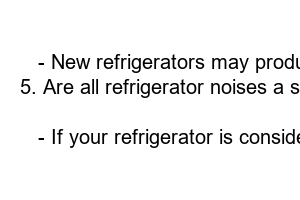냉장고 소음 원인
Title: What’s That Noise? Discovering the Causes of Refrigerator Noise
Introduction: We rely on our refrigerators to keep our food fresh and our drinks cool. However, sometimes these essential appliances can make strange and distracting noises that can leave us wondering if something is wrong. In this blog post, we will explore the various causes of refrigerator noise, helping you understand why your fridge might be hum, buzz, or clank.
1. Vibrating Condenser Coils: Is your refrigerator making a buzzing noise?
– Refrigerators consist of condenser coils that vibrate when the compressor is running.
– Over time, these coils can accumulate debris or become loose, causing vibrations and buzzing sounds.
2. Faulty Evaporator Fan Motor: Why is your refrigerator making a loud humming noise?
– The evaporator fan motor is responsible for circulating cold air throughout the refrigerator.
– If the motor fails or becomes worn out, it can create a persistent humming noise.
3. Malfunctioning Compressor: Is your fridge making a loud clanking or banging noise?
– The compressor is the heart of a refrigerator, compressing refrigerant gas.
– If the compressor is faulty or struggling, it can create clanking or banging sounds.
4. Noisy Ice Maker: Why is your refrigerator rattling or making clattering sounds?
– Ice makers are often susceptible to wear and tear or ice blockages.
– When the ice maker is malfunctioning, it can cause rattling or clattering sounds as it tries to produce ice.
5. Unbalanced or Faulty Fan Blade: Is your fridge producing a loud whirring or scraping noise?
– The fan blade is crucial for circulating air over the evaporator coils.
– If the blade becomes dirty or unbalanced, it can produce a whirring or scraping noise.
6. Clogged Drain Pan or Defrost Heater: Are you hearing a hissing or sizzling sound?
– The drain pan collects water from the defrost heater, where it evaporates.
– If the drain pan is clogged or the defrost heater is malfunctioning, it can cause hissing or sizzling noises.
7. Worn Door Seals: Why is your refrigerator making a whistling or hissing sound?
– Damaged or worn door seals can allow warm air to enter the refrigerator, causing it to work harder.
– As the air escapes, it can produce whistling or hissing sounds.
Summary: We’ve explored the various causes of refrigerator noise, including vibrating condenser coils, faulty evaporator fan motor, malfunctioning compressor, noisy ice maker, unbalanced or faulty fan blade, clogged drain pan or defrost heater, and worn door seals. If you encounter any of these issues, it’s recommended to consult a professional technician for proper diagnosis and repair.
FAQs:
1. Can refrigerator noise be fixed?
– Many refrigerator noises can be fixed, depending on the cause. It’s advisable to seek professional help for accurate diagnosis and repair.
2. How can I reduce refrigerator noise?
– Keeping the fridge on a level surface, cleaning the coils, and regular maintenance can help reduce refrigerator noise.
3. How long do refrigerators typically last before they become noisy?
– The lifespan of a refrigerator varies, but typically, they can last between 10 to 20 years before experiencing significant noise issues.
4. Why is my new refrigerator making more noise than my previous one?
– New refrigerators may produce more noise initially due to their advanced features and higher efficiency.
5. Are all refrigerator noises a sign of a problem?
– Not all refrigerator noises indicate a problem. Some sounds, like occasional clicks or gurgling, are normal during operation.
6. Is it worth repairing an old refrigerator making noise?
– If your refrigerator is considerably old and the noise issues persist, it is advisable to invest in a newer, more energy-efficient model.

